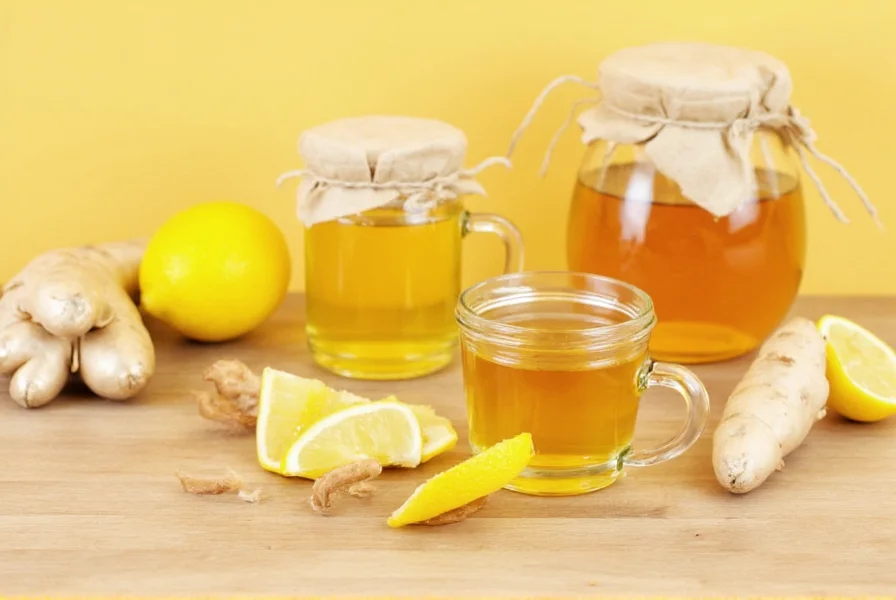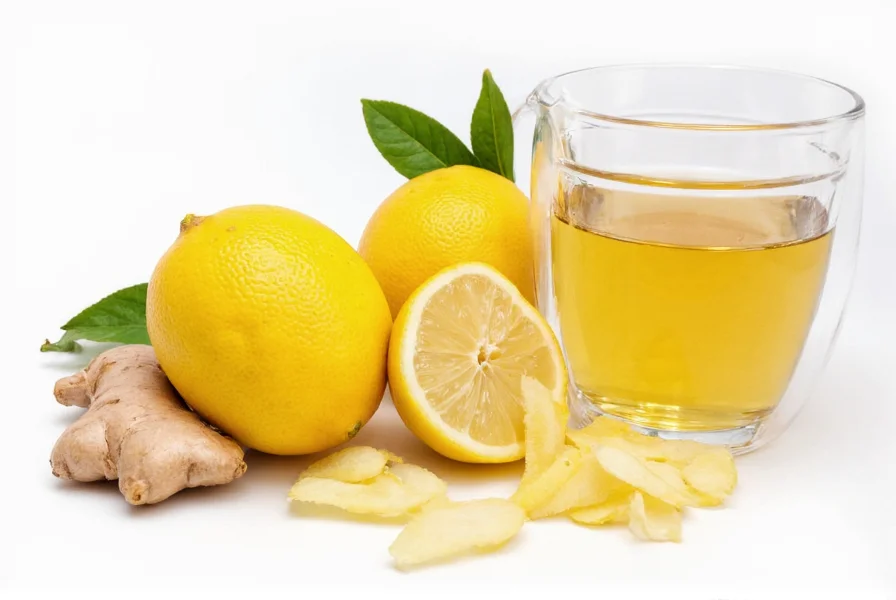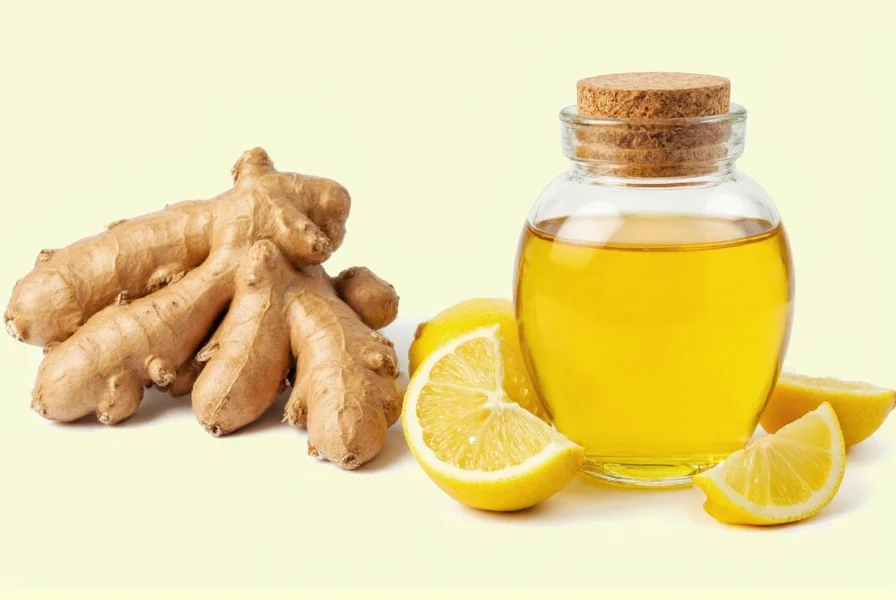For generations, people worldwide have turned to ginger lemon honey as a go-to remedy when cold season strikes. This simple yet powerful combination offers more than just comfort—it delivers scientifically supported benefits that can help your body fight minor illnesses. Understanding how each ingredient contributes to your wellness can help you use this natural remedy more effectively.
The Science Behind Each Ingredient
Ginger: Nature's Anti-Inflammatory Powerhouse
Ginger contains bioactive compounds like gingerol that have demonstrated anti-inflammatory and antioxidant effects in numerous studies. Research published in the Journal of Medicinal Food confirms ginger's ability to reduce inflammation in the respiratory tract, making it particularly valuable for soothing irritated tissues during colds. When preparing ginger lemon honey remedies, fresh ginger root provides significantly higher concentrations of these beneficial compounds compared to powdered alternatives.
| Ingredient | Key Compounds | Primary Health Benefits |
|---|---|---|
| Ginger | Gingerol, shogaol | Anti-inflammatory, nausea relief, pain reduction |
| Lemon | Vitamin C, flavonoids | Antioxidant support, immune function, hydration |
| Honey | Phenolic compounds, hydrogen peroxide | Soothing effect, antimicrobial properties, cough suppression |
Lemon: Vitamin C and Antioxidant Boost
Lemons provide a substantial dose of vitamin C, which supports immune function and acts as an antioxidant protecting cells from damage. While lemon alone won't cure a cold, its vitamin C content helps maintain healthy immune system function during illness. The citric acid in lemon also helps break up mucus, providing relief from congestion. For maximum benefit in your ginger lemon honey preparation, use freshly squeezed lemon juice rather than bottled varieties which often contain preservatives and have lower nutrient content.

Honey: The Soothing Antimicrobial
Honey's value in respiratory remedies is well-documented in medical literature. A comprehensive review in Cochrane Database of Systematic Reviews concluded that honey provides superior cough relief compared to placebo and some over-the-counter medications. Its thick consistency coats irritated throat tissues, while its natural hydrogen peroxide content offers antimicrobial properties. When creating your ginger lemon honey mixture, raw, unprocessed honey retains more beneficial enzymes and compounds than heavily processed varieties.
Preparing the Perfect Ginger Lemon Honey Remedy
Creating an effective ginger lemon honey remedy requires attention to preparation methods that maximize the benefits of each ingredient. Follow these evidence-based steps for optimal results:
- Start with fresh ingredients: Use organic ginger root, fresh lemons, and raw honey for maximum potency
- Prepare the ginger: Peel and thinly slice or grate 1-2 inches of ginger root
- Steep properly: Simmer ginger in 1-2 cups of water for 10-15 minutes (longer for stronger effect)
- Add lemon last: Remove from heat before adding 1-2 tablespoons of fresh lemon juice to preserve vitamin C
- Finish with honey: Stir in 1-2 tablespoons of honey after the mixture cools slightly (above 140°F degrades honey's beneficial compounds)
When Ginger Lemon Honey Works Best
This natural remedy shows the most benefit for specific conditions:
- Sore throats: The honey's coating effect provides immediate soothing relief
- Mild coughs: Particularly effective for nighttime coughs that disrupt sleep
- Early cold symptoms: May help reduce symptom severity when used at first signs
- Digestive discomfort: Ginger's properties can ease nausea and upset stomach
For optimal results with your ginger lemon honey for sore throat relief, consume 2-3 times daily while symptoms persist. The warmth of the tea provides additional comfort by increasing blood flow to throat tissues.
Safety Considerations and Limitations
While generally safe for most adults, certain precautions apply when using ginger lemon honey remedies:
- Infants under 1 year: Never give honey to infants due to botulism risk
- Diabetes management: Monitor honey consumption as it affects blood sugar
- Ginger interactions: May interact with blood thinners; consult your doctor
- Dental health: Rinse mouth after consumption to protect tooth enamel from lemon's acidity
Remember that ginger lemon honey benefits for immunity are supportive rather than curative. This remedy works best as part of a comprehensive approach to wellness that includes proper rest, hydration, and nutrition. It should never replace professional medical care for serious conditions.

When to Seek Medical Attention
Natural remedies like ginger lemon honey for cough provide comfort for minor ailments, but certain symptoms require professional evaluation:
- Fever above 101.5°F (38.6°C) lasting more than 48 hours
- Difficulty breathing or shortness of breath
- Symptoms persisting beyond 10 days without improvement
- Severe throat pain making swallowing difficult
- Signs of dehydration or extreme fatigue
Understanding the appropriate use cases for your ginger lemon honey tea ensures you receive the maximum benefit while recognizing when professional medical care becomes necessary.
Maximizing Your Natural Remedy Experience
To get the most from your ginger lemon honey preparation, consider these evidence-based enhancements:
- Add a pinch of turmeric for additional anti-inflammatory effects
- Include a cinnamon stick during steeping for complementary health benefits
- Use warm rather than hot water if adding honey directly (to preserve enzymes)
- Store prepared ginger syrup in the refrigerator for up to two weeks
For those interested in the scientific evidence for ginger lemon honey, numerous studies support the individual components' benefits, though research on the specific combination remains limited. The effectiveness likely stems from the synergistic effects of these ingredients working together to support the body's natural healing processes.
Frequently Asked Questions
Does ginger lemon honey really work for sore throats?
Yes, ginger lemon honey can effectively soothe sore throats. The honey coats irritated throat tissues providing immediate relief, while ginger's anti-inflammatory properties reduce swelling. Lemon helps break up mucus. Multiple studies support honey's effectiveness for throat pain, with one Cochrane review finding it superior to placebo for cough and throat irritation.
How often should I drink ginger lemon honey tea when sick?
For optimal results, consume ginger lemon honey tea 2-3 times daily while experiencing symptoms. Many people find taking one cup before bed particularly helpful for nighttime coughs. Continue use for 5-7 days or until symptoms significantly improve. Remember to let the tea cool slightly before adding honey to preserve its beneficial compounds.
Can I use bottled lemon juice instead of fresh lemons?
Freshly squeezed lemon juice is significantly more beneficial than bottled varieties. Bottled lemon juice often contains preservatives and has lower vitamin C content due to processing and storage. Fresh lemon provides higher concentrations of antioxidants and bioactive compounds that contribute to the remedy's effectiveness. For best results in your ginger lemon honey preparation, always use freshly squeezed lemon juice.
Is it safe to give ginger lemon honey to children?
Ginger lemon honey is generally safe for children over 1 year old, but honey should never be given to infants under 12 months due to botulism risk. For children ages 1-6, use half the adult serving size. Consult a pediatrician before using this remedy for children with chronic health conditions or if symptoms persist beyond 3-4 days.
How long does homemade ginger lemon honey last?
Properly stored in an airtight container in the refrigerator, homemade ginger lemon honey syrup can last 2-3 weeks. Freshly prepared tea should be consumed within 24 hours. Signs of spoilage include cloudiness, mold, or an off smell. For longer storage, freeze portions in ice cube trays then transfer to freezer bags for up to 3 months.











 浙公网安备
33010002000092号
浙公网安备
33010002000092号 浙B2-20120091-4
浙B2-20120091-4